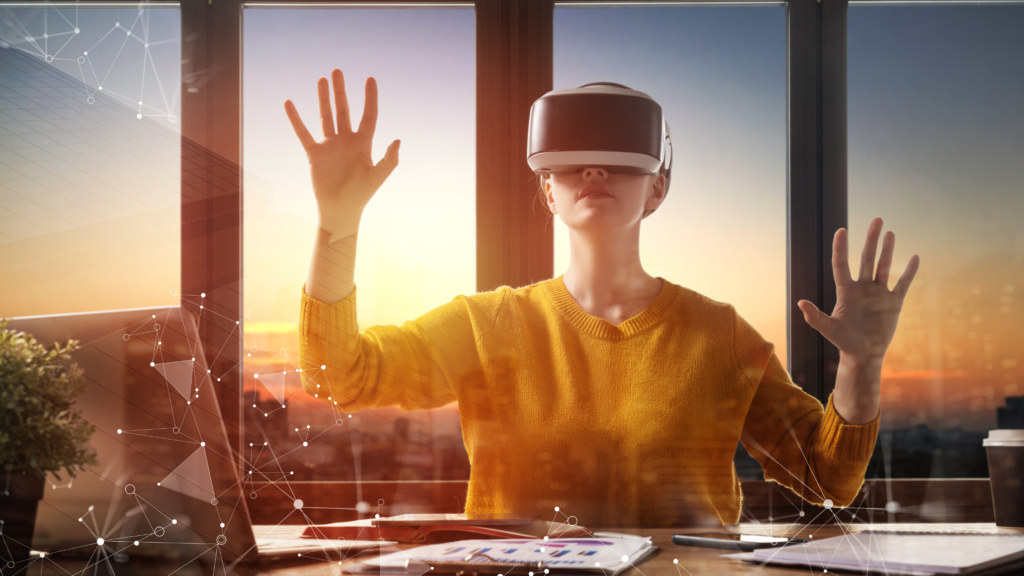Empowering Learning: The convergence of AI and VR for Training Excellence
The integration of Artificial Intelligence (AI) & Virtual Reality (VR) in training is gradually becoming popular across various industries due to the potential benefits they offer in the enhancement of learning experiences. Here’s an overview of how AI and VR are being utilized in training programs across industries – 1. Personalized Learning: AI algorithms can analyze user data & behaviour in real-time to personalize training content in VR environments. This ensures that learners receive accurately tailored experiences based on their current strengths, weaknesses, & learning preferences. 2. Realistic Simulations: VR provides highly immersive environments that can simulate real-world scenarios. Moreover, by combining AI with VR, training scenarios can dynamically adjust based on user interactions & decisions, offering realistic simulations that enhance the user’s skill development & decision-making abilities. 3. Adaptive Feedback: AI can provide real-time feedback right within VR environments. This feedback can then be tailored according to the user’s performance, all the while offering suggestions for improvement, & seamlessly guiding the user through the training process. 4. Natural Language Processing (NLP): The integration of NLP & VR allows users to interact with virtual environments using their natural language patterns. AI-powered chatbots or virtual assistants can guide learners, answer questions, provide explanations, while creating a more engaging & interactive training experience. 5. Data Analysis & Insights: AI algorithms can analyze the data collected from VR training sessions to identify patterns, trends, & areas for improvement. This data-driven approach enables organizations to optimize training programs & enhance learning outcomes, while positively impacting productivity. 6. Remote Training & Collaboration: VR platforms that are powered by AI facilitate remote trainings & collaboration by allowing users to interact in real-time with each other but in virtual environments. This is particularly beneficial for geographically dispersed teams or individuals who cannot attend in-person training sessions. 7. Skill Assessment & Certification: AI powered algorithms can assess users’ skills & knowledge within VR environments, thereby allowing organizations to track progress, identify competency gaps & issue certifications based on performance. 8. Continuous Learning & Adaptation: AI-powered VR training systems can adapt to users’ progress & dynamically adjust the difficulty level or content based on their skill level. This ensures that training remains challenging & engaging, while facilitating continuous learning & skill development. 9. Building Engaged Learning Communities: AI technology fosters vibrant learning communities in VR training environments, connecting learners with peers, mentors, and experts. Through virtual networking events, collaborative projects, and discussion forums, AI enhances social interaction and knowledge sharing, boosting engagement and participation. 10. Boosting Engagement with Gamification: AI-driven VR training platforms incorporate gamification elements such as challenges, leaderboards, and rewards to motivate users and encourage active participation. By leveraging intrinsic motivators, gamified VR training experiences improve engagement and retention rates, enhancing the learning process. 11. Streamlined Integration with Learning Management Systems: AI-powered VR training seamlessly integrates with existing learning management systems, simplifying administrative tasks like progress tracking and report generation. This integration ensures scalability and compatibility, optimizing the efficiency of VR training initiatives within organizational frameworks. 12. Insightful Behavioral Analysis for Soft Skills Development: AI algorithms analyze user interactions within VR simulations, providing valuable insights into behavioural patterns and emotional responses. This feedback facilitates the development of essential soft skills such as communication and empathy, enriching the overall training experience. Overall, the integration of Artificial Intelligence & Virtual Reality in training holds significant promise for improving learning outcomes, increasing engagement & providing more effective ways to develop a user’s skills in various domains. Technological advancements will lead to further innovations in this area, leading to more immersive & personalized training experiences. We invite you to explore the world of English Arcade and embark on a journey of self-improvement and growth. Visit our website here to delve deeper into our services and discover how we can help you unlock your full potential. Thank you for choosing English Arcade, where every word contributes to your success.
Empowering Learning: The convergence of AI and VR for Training Excellence Read More »

